
How We Do Keyword Research

We Spend Time On Research
One of the most important things to do for keyword research is to spend time on it. The more time you spend, the better your keyword research will be. Solid keyword research sets the tone for the rest of the pipeline.

We Discuss And Outline Your Goals
The next thing to do would be to discuss your business goals with you. This will give all parties insights into what to do and how to do it. A clear understanding of this will help accelerate results for your business.

We Audit Your Website For Keywords
Something that our competitors sometimes miss is keyword audit. We audit your website for existing keywords so we can build a better keyword plan moving ahead. Our expert audit highlights where you need to focus on keywords.

We List Out Relevant Niche Keywords
Businesses need to understand what their money keywords are. It allows them to improve their reach and web traffic. Ensuring that you have the right keywords added increases ROI and revenue.

We Calculate Various Keywords Metrics
When running a keyword campaign, one of the most critical things is finding the right metrics. Identifying and working on niche-related metrics will get you the most out of your SEO campaign.

We Choose The Right Team And Tools
Each business has unique needs which should be fulfilled. We understand this, so we select the right team and tools for the job. We have expert people who use the best tools in the business to get results for you.

We Highlight Required Changes For Your Approval
At our agency, it's not just about reporting but also action. Along with our detailed report, we also send you our list of recommendations that you can use. It will help you set your SEO right on track.

We Implement The Keyword Optimizations
Once we've aligned everything, we bring everything together. We implement our keyword analysis across your website and other collateral. This ensures that you get consistent results across all platforms.
Benefits of Keyword Research

It Is The Foundation Of An SEO Pipeline
Keywords are the foundation for your content strategy. There is very little chance of ranking well against your competition without them. While many people focus on keywords, most marketers fail to realize the competition for each of those keywords.

It Gives You New Perspective
Proper keyword research can give business owners a new perspective on their brand. It might open new avenues and give them better insights to improve how they do business.

It Improves Your Engagement Rate
People are more likely to engage with content relevant to them. By identifying keywords, you can help your audience better understand the content you produce. And if they understand it, they'll be more likely to engage with it.

It Helps You Find More Topics
Content creation is the crux of marketing today. But to create effective content, you need the right topics to write on. Keyword research can deliver a wide range of topics for your content strategy.

It Raises Conversions Per Lead
One of the best ways to ensure that you're making the most of your content is through keyword research. The better your keywords are, the more opportunities you'll have to expand your business and improve conversions.

It Streamlines The Rest Of Your SEO Process
Most SEO processes build on the success of comprehensive keyword research. Having a powerful keyword research strategy is critical in more ways than one. It sets you up for the rest of your SEO pipeline.

It Gets You A More Targeted Audience
Another advantage of having a powerful keyword research process is better to control over your campaign. Your marketing process can attract the right kind of people to your brand. This results in better engagement and conversions.

It Gets You Results Quicker
When you have a more accurate keyword research strategy, it has many advantages for your business. One important advantage is that it expedites results for your marketing. Keyword research can accelerate results for your brand.

It Helps Competition Analysis
If you need to be successful, you need to focus on getting ahead of your competitors. Keyword research helps you get better keywords for your product than your competitors. The right keyword can help you compete more effectively.

It Works For Future PPC Campaigns
Doing keyword research can be a strong foundation for your future paid marketing. When you opt for ads for your marketing, you don't need to spend time on additional keyword research.

It Leverages Social Media Strength
Social media has become a huge marketing opportunity for big brands. To do well on it, you need to find the right keywords. This is where powerful keyword research can help you out. Get improved traffic and engagement from your visitors.

It Gives You Powerful Customer Insights
Keyword research gives you powerful insights into your audience and potential customer behavior. This includes keywords related to buying habits and interests. Also, even more details like language patterns and terms associated with buyers.
What is Keyword Research?
Keyword Research is an SEO term. It refers to researching search terms people use on search engines—keywords may be specific to products or services or just general information.
Using keywords naturally in your content and website helps search engines match a user query.
It involves choosing a topic and listing keywords you want to rank for in search queries. Keyword research offers deep insights into customer trends. Keywords can consist of more than one word or, in some cases, an entire phrase.
Importance of Keyword Research
![]() Uncover Market Trends
Uncover Market Trends
When you research keywords, you uncover what's trending. It gives you a better insight into what people search for and how the market addresses it. It helps you plan a direction for your business.
Keyword research helps you craft effective marketing and sales strategies.
It increases your knowledge of customer behavior and gives you a realistic idea about seasonal trends for a product or service.
This can be useful in planning any sales events or promotions. It can also help product companies identify which products to stock up on within a specific season to get more sales.
The search volume in this keyword research result by WordStream helps companies know what popular products to stock up on.

![]() Gain Web Traffic
Gain Web Traffic
One of the primary reasons for search engine optimization is to grow the traffic on a website. A key strategy to achieve it is to find out what people are searching for and create relevant content that matches their expectations.
Performing keyword research is fundamental to gaining qualified web traffic. When you find the right keywords for your content, you will rank higher in search results.
Here’s an example of top search results due to the usage of the right keywords.
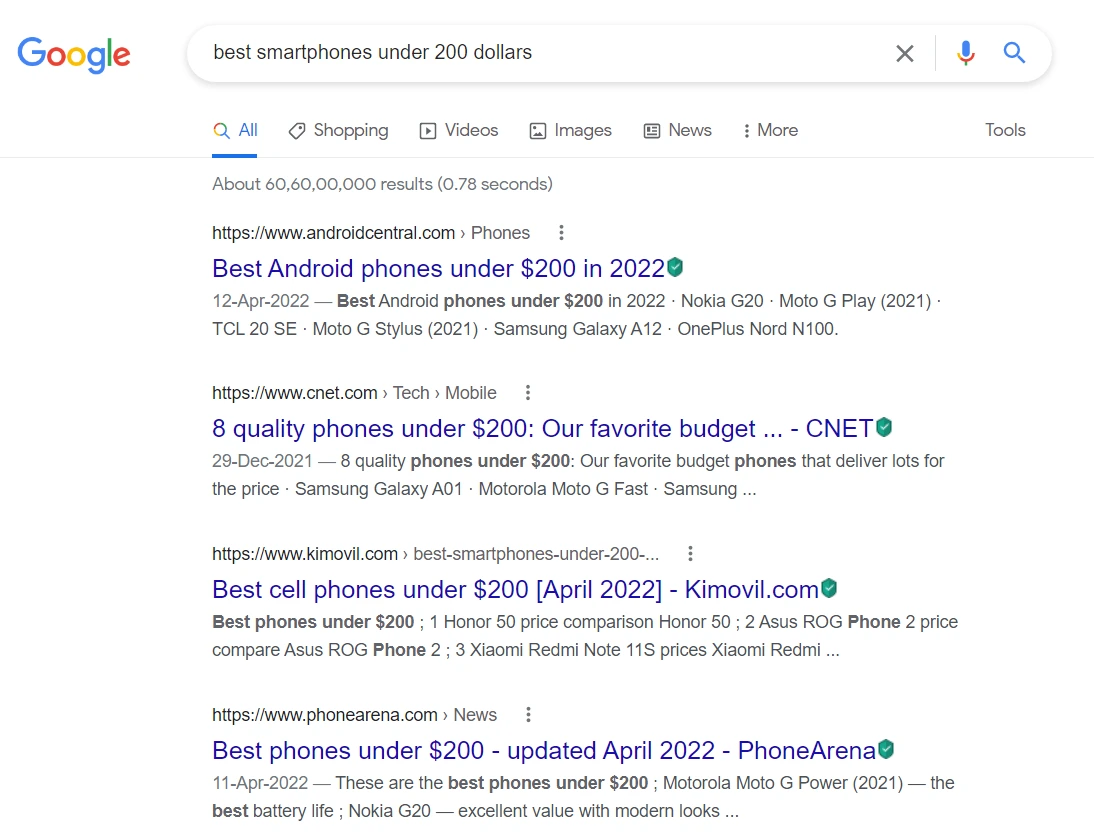
The longer you stay on the top result pages, your reputation grows. An increase in web traffic leads to better sales. It also indicates that your business is healthy and credible.
Read: 9 Local SEO Tips To Drive Foot Traffic to Your Business
![]() Generate Leads
Generate Leads
Keyword research is not just to drive traffic or rank higher. It plays a crucial role in creating leads and driving sales volumes. Finding and targeting the right keywords can be an excellent start for your sales funnel.
You can use wordtracker to find the right keywords.

When people find content or products relevant to their searches, it leads to two things. It can propel them to action and buy or research more before deciding. How you use your top-ranking keywords makes all the difference.
Focused keyword research coupled with quality content can generate leads that convert easily.
Read: Benefits of Lead Generation for an Ecommerce Site
![]() Better Content Strategy
Better Content Strategy
Quality content is an unbeatable asset. It can make even a small company reach great heights. In the world of SEO, keyword research directly impacts content. It allows you to find topics that people are interested in within your field.
Knowing what keywords trend at certain times or specific months can help plan a robust content strategy.
You can use Google Trends to analyze the popularity of keywords.

For example, if you know that a particular keyword trends during Christmas, you can plan for content based on that theme.
Doing so will give you more reach with your target audience on the web and social media platforms.
![]() Focused Audience targeting
Focused Audience targeting
You need to identify and target the right audience as a business. Investing in SEO and digital marketing is a waste of money if your campaigns are not curated to reach a specific customer base. Keyword research plays a vital role in reaching the right audience.
It tells you what people in your industry are searching for on the web.
Once you incorporate those words or phrases into your posts, URLs, or other metadata, you amplify your reach. You are in a stronger position to reach and convert the right audience.
You can find the best keywords to use by analyzing your competitor’s business with SEMrush:
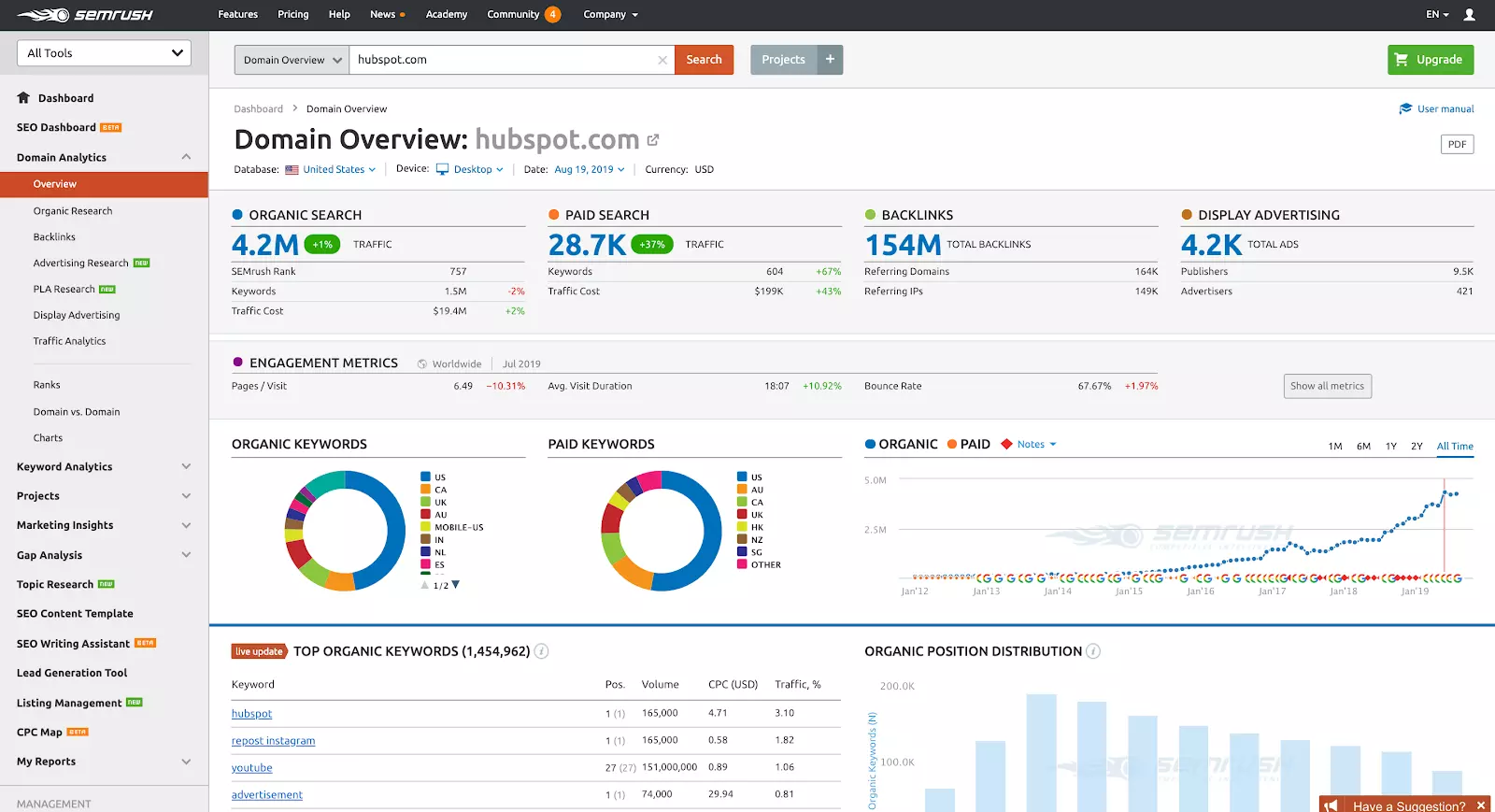
![]() Rank High in Search Results
Rank High in Search Results
Studies show that content with top-ranking keywords gets the most hits.
You can effectively use keywords in URLs, headers, and titles to get more attention from search engines. Google uses keywords as one of the factors to rank a website for a search query. It crawls the site for relevant keywords in context with a user's search intent.
Search engines rank a page on the first page of its results when keywords are used naturally and are of most relevance. The higher your ranking, the more likely a user will click on it.
Here’s an example of two websites that use high-ranking keywords in the title tag.

![]() Gain Social Shares
Gain Social Shares
Good keyword research leads to great content. You begin writing about topics that people are interested in. It could be general or specific content to a product or domain. Whatever the case, keyword research and good content attract people.
It goes beyond an increase in web traffic. Your content can go viral by being shared on social media platforms like Facebook or Twitter.
Adding a social share button is a great way for site visitors to share your content on social media. Social sharing increases your reach online. It amplifies your reputation and increases traffic.

![]() Beat Your Competition
Beat Your Competition
Many online tools can tell you where your content and keywords stand against your competitors.
- It's easier than ever to know what keywords they are targeting. This insight is valuable in many ways.
- It can help you find unique keywords and phrases that can outdo your competitors.
- It can also give you better ideas for content on your website, which may attract more visitors to your website.
Keyword research tells you which keywords have the potential for better conversions. Using all these data points, you can excel better than your competitors.

Keyword Research Tips
![]() Use Google Suggest
Use Google Suggest
Google suggests the popular auto-complete feature on the search engine. It uses a robust algorithm to suggest other words you can use in your online searches. It has proven a useful feature over the years.

You can capitalize on this feature to improve your keywords game as a business. It is great for suggesting long search phrases that people use.
For example, "Best furniture store in the bay area." These offer great insights into the type of searches when people look for products or services in your domain.
To boost your keyword research:
- Try a different word or phrase combination for your product or service. Look for the keyword suggestions from Google. Use these to fine-tune the content and titles of your website.
- Use your location with a search term to identify trending topics or competitors.
![]() Go Local
Go Local
Local keywords are those that resonate with a specific location. These can be powerful for SEO, especially for businesses such as restaurants, cafes, or showrooms.
People searching for products or services locally have a specific intent. They want to locate something in a particular area. They may use terms like "clock repair Washington."
You can use WordStream to find local keywords.
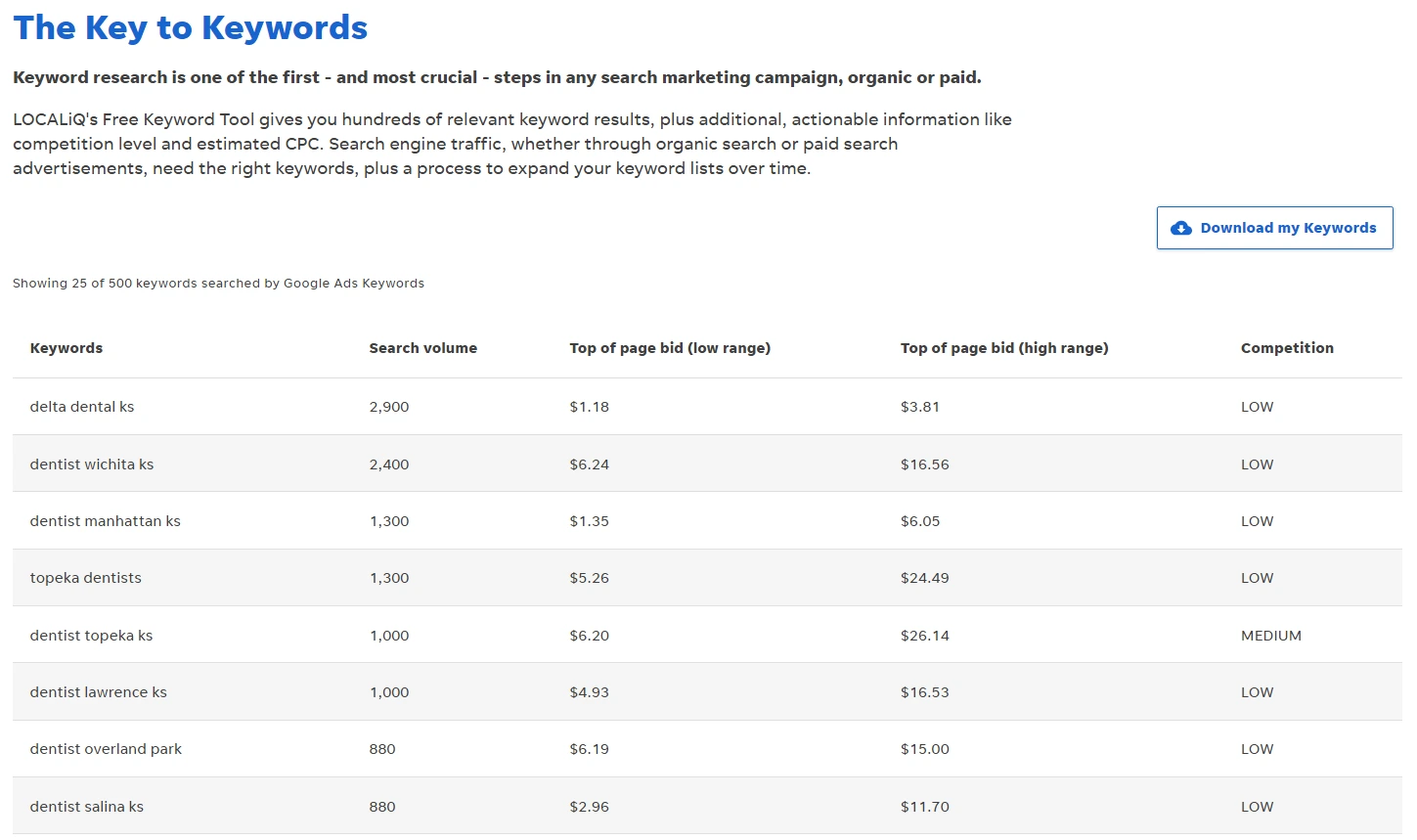
When you begin using local place names in your content and headings, it can boost your SEO. Not using local terms and place names to your benefit can lead to missed sales opportunities.
To make the best of local search intent, try some of these techniques:
- Narrow down a list of top keywords in your industry. Then add "Great" or "Best" to your content titles. For example, A blog title can be "Best Lounge Club in Boston."
- Check the local keywords your competitors are using.
![]() Get To Know Your Industry
Get To Know Your Industry
It pays to have great products and services and know more about your industry. To come up with relevant keywords, you need to know the hot trends in your domain. You need to dig more about people's words to search for similar services.
You can gain a wealth of information from keeping tabs on industry trends. Use this knowledge to develop unique keywords that reflect people's actual needs.
A few ways you can use industry insights:
- Read top industry blogs and attend popular conferences and events. It helps you gain a pulse of what is popular. Use these insights to curate relevant content or social campaigns.
For example, TechRadar is a fantastic website to update yourself about the latest trends in tech.

- Talk to your support teams to get a feel for common customer pain points. Improve your help content and write informative blogs to close gaps.
![]() Identify Hot Content Ideas
Identify Hot Content Ideas
Quality content relevant to a user's search is a cornerstone of good SEO. To curate great content, keywords act as stepping stones. You can't put out content that matters unless you know what your target audience wants.
Getting content ideas from keywords is not always easy. Luckily, there are many great tools to give you great content ideas based on keywords.
Here are our favorites:
KWFinder: A great tool that throws up dozens of possible keywords based on a sample keyword. Identify unique content ideas from keywords relevant to your business.
Answer The Public: This works similarly to KWFinder. Just enter a topic and search to get loads of content ideas based on actual search phrases used by people. You can even narrow it down to specific countries.
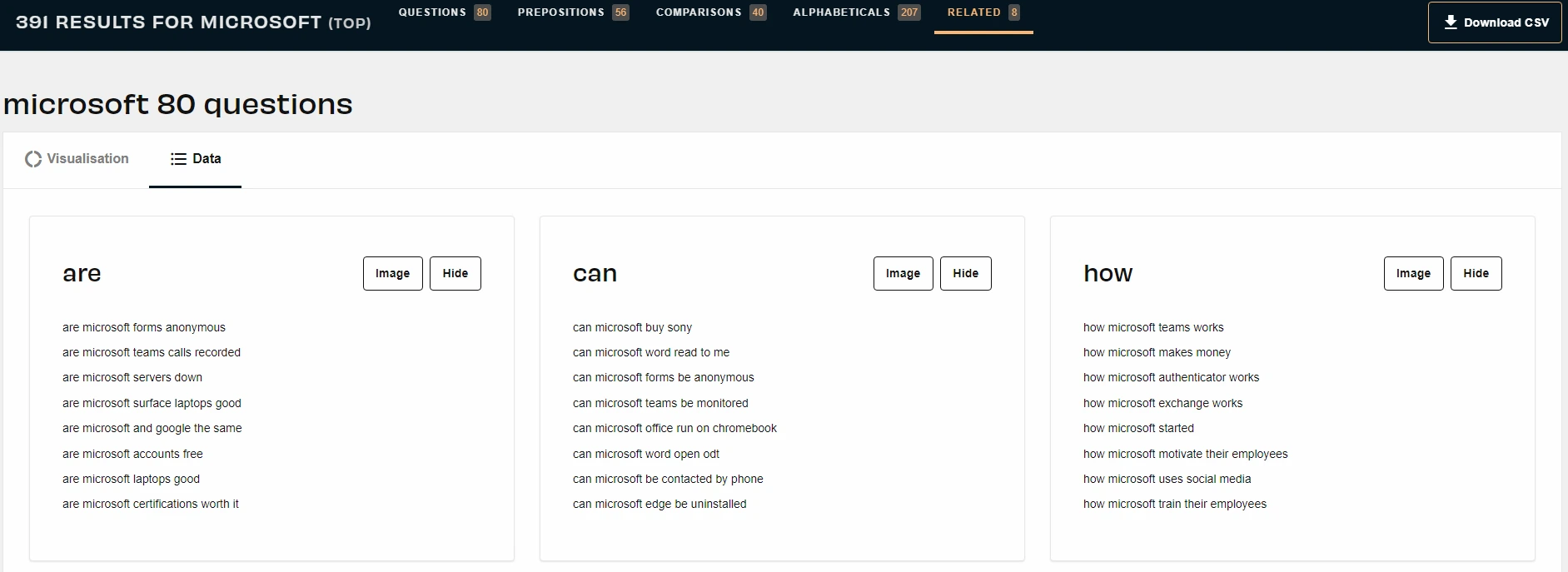
![]() Research Competitor Keywords
Research Competitor Keywords
Always keep an eye on other top players in your industry. It pays off in the long run. Not knowing your competitor's keyword strategy can cause you to lose SEO ground quickly. Keep track of your competitor rankings and identify the keywords they target.
Spend time analyzing the type of content they have on the site. Check their social media pages to find content shares such as blogs or videos.
You gain excellent insights for your keyword research by tracking your competition. We suggest you try these tips:
- Run a content gap analysis and list content areas where they excel. Fine-tune your content to bridge these gaps and bring the quality of your content on par with your competition.
- Use tools like SpyFu to track the top keywords used by the competition.
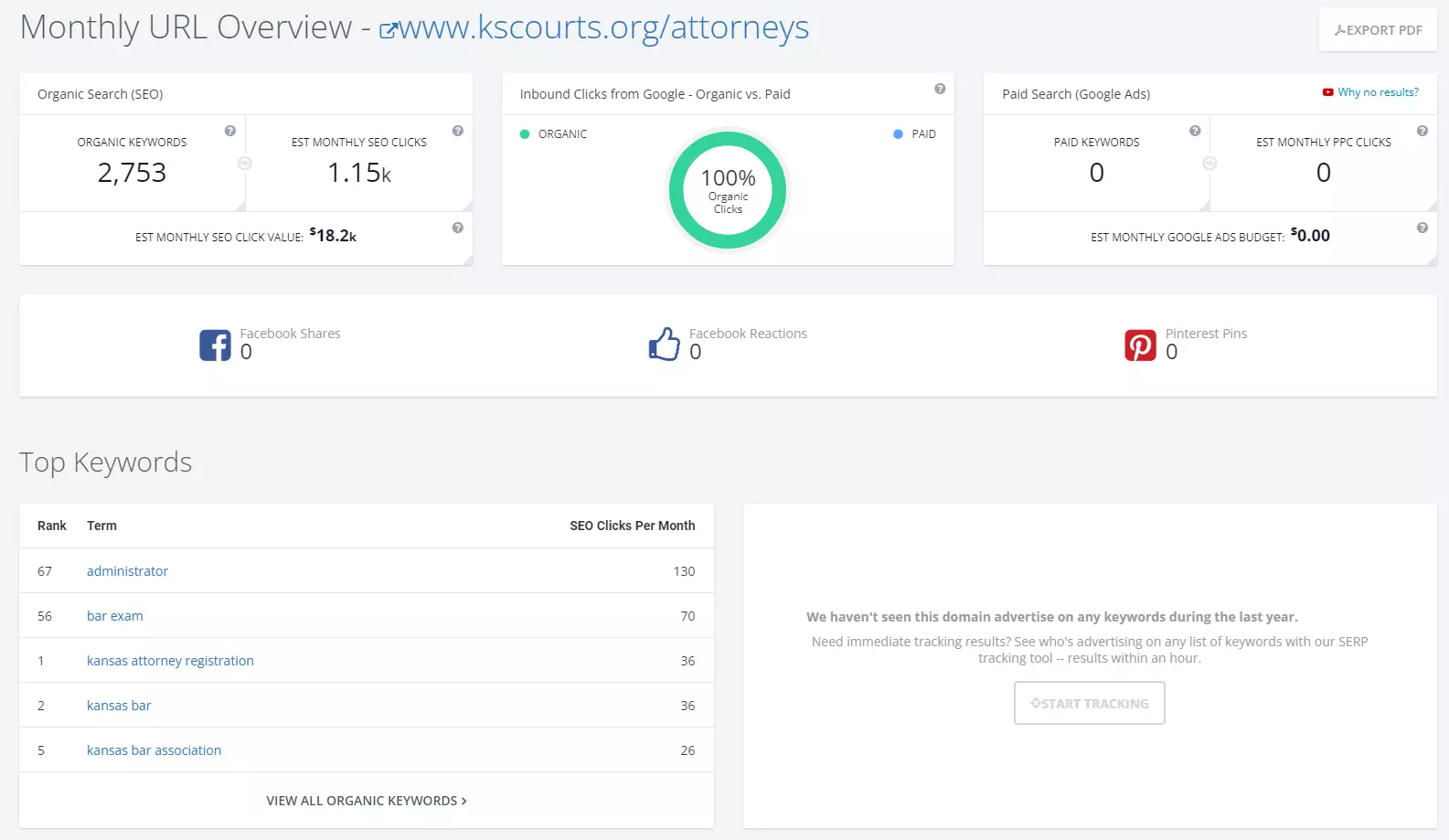
![]() Investigate Long-tail Keywords
Investigate Long-tail Keywords
Long-tail keywords use more words than usual and are less specific. They are not as common as one-word keywords but can be great for increasing leads.
A typical long-tail keyword could be: "Buy bicycle headlamp for BSA cycle."
As you can see here, the search is specific to the product and the brand (Cycle + BSA). A business that has used these keywords stands a better chance of a sale as their site will come up first in the results.
So how does one find the best long-tail keywords?
- Ahrefs Keyword Explorer: Enter a keyword and see hundreds of possible long and short-tail keywords for your SEO efforts.

- Google Suggest: Type your keyword into Google and see possible suggestions around it. Use the most unique and relevant long-tail words in your SEO strategy.
![]() Use Google Keyword Planner
Use Google Keyword Planner
Google Keyword Planner is a free tool that helps you scope the best keywords for your website. You only need a Google Ads account to be able to access it. Research new keywords and also get insights about search volumes or forecasts.
The most helpful feature of the tool is "Discover new keywords." All you do is enter specific words that define your business. For example, "Dentist" or "Room heaters." The planner displays possible keywords that relate to the entered term.
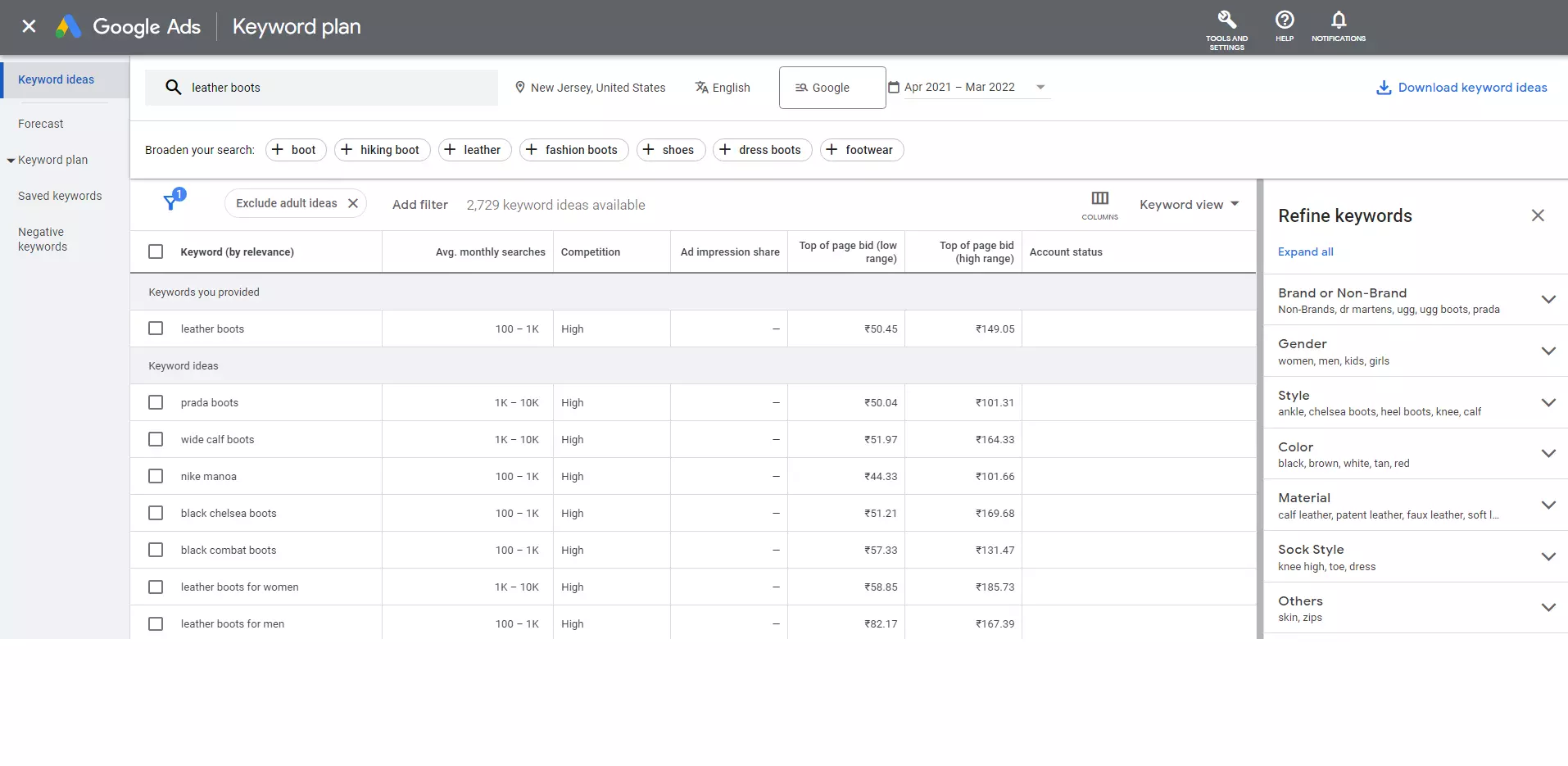
Use These Proven Tips To Do Better Keyword Research:
- Filter the list of keywords based on several factors. A few popular ones are relevance, average monthly searches, and competition.
- Enter multiple keywords separated by a comma to discover unique keyword opportunities. For example, you can enter "low carb diet, high protein diet" to get a mix of unique keywords.
![]() Leverage Seasonal Trends
Leverage Seasonal Trends
Content planning and keyword research work in tandem. You can get a step ahead when you come up with unique keywords that rank high.
One way to do it is to target seasonal keywords. These are keywords people use during specific times during the year. For example, searches for Christmas baubles for decoration in December.
So how does it help?
If you focus on creating Christmas-themed content during December, you are more likely to get more traffic and sales.
Let's Look At A Few Best Practices:
- Use Google Trends to discover trending seasonal keywords. You narrow down historical data for a specific date range in the past to see what keywords were trending.

- Plan your content much ahead for special days like Christmas or Valentine’s Day if your business resonates with these themes.
![]() Analyse Google Search Console Data
Analyse Google Search Console Data
Google Search Console is a dashboard that can offer great keyword insights. Every business serious about ranking high must create a Google My Business (GMB) profile.

Read: What are the Benefits of a Google My Business Listing?
The "Search results" report shows you the top keywords you rank for. Ideally, you will find a list of keywords you are already targeting. The good news is that it also shows plenty of other keywords that may be relevant to your business or content.
Let's look at a few ways to make the best use of it to discover more keywords:
- Look for keywords with high impressions that you have not targeted in the past. Use the filters on the console to deep dive into your keyword strategy.
- Compare your findings with competitor rankings and plan your content around the new keywords.
![]() Use Keyword Research Tools
Use Keyword Research Tools
Keyword research is essential to any SEO effort, local or global. There are many free and paid tools for keyword research out there. How do you choose the best with algorithms changing so often?
There are several key factors to consider:
- Is it free or paid? Does it come with a trial version?
- How are its reviews on SEO forums? What features stand out?
We take the guesswork out of it and list two of our favorite tools:
- SEMRush: A popular tool that offers dozens of keyword ideas and insights such as monthly searches and volumes.
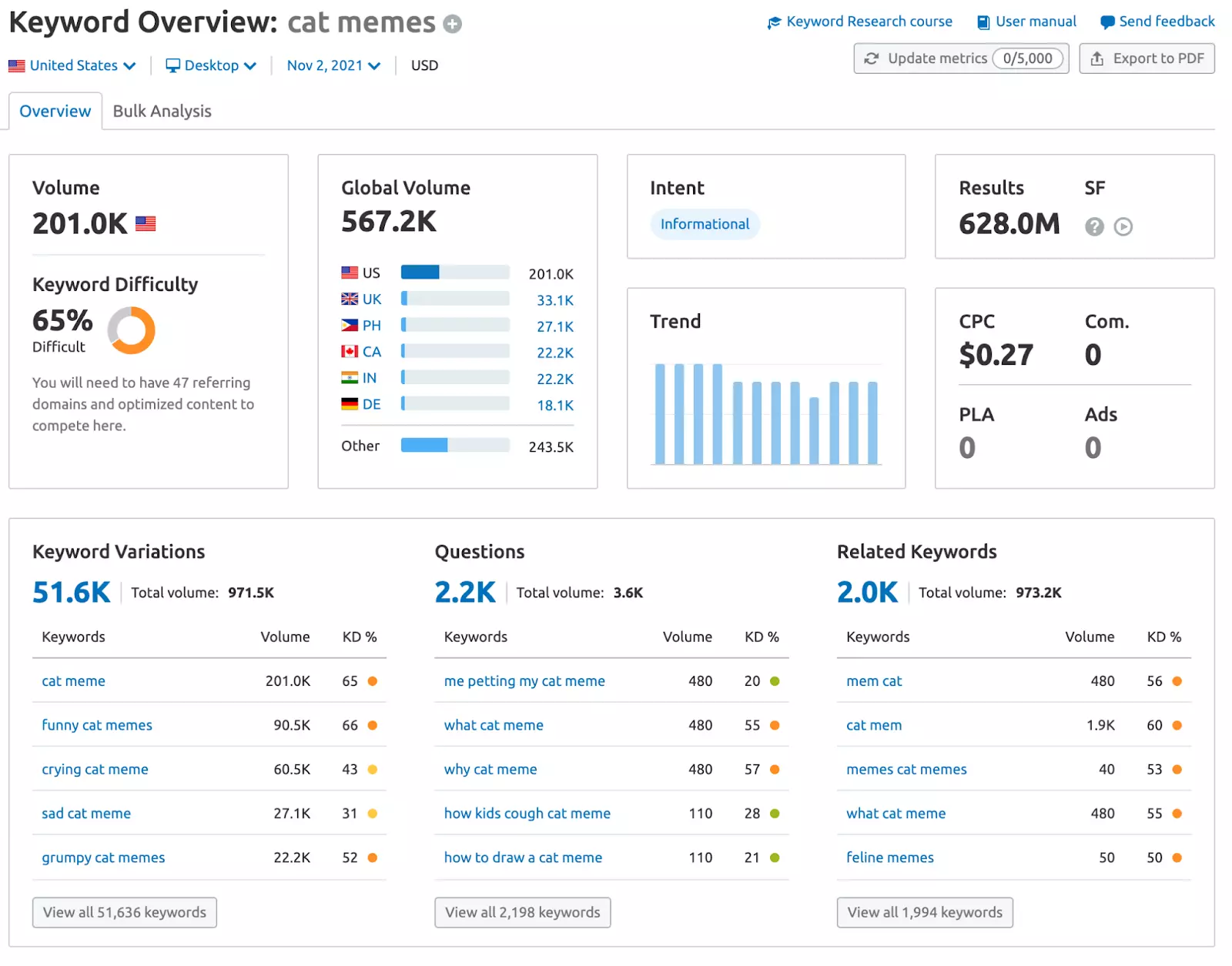
- Answer The Public: A unique tool that presents keyword data in a visual form. Just enter a keyword and see a massive display of keyword ideas.
![]() Do Social Media Keyword Research
Do Social Media Keyword Research
Keyword research for social media does not follow the same rules as your website. You need to know your audience's words and phrases on social media sites like Facebook or Instagram.
Doing keyword research for social media has many benefits:
- Identify the frequency of a search query
- Gauge interest in products and services
- Discover better ways to engage with audiences
Read: How to Promote Your Business Locally Using Instagram
Follow our tried and tested tips below for effective social media keyword research:
- Look at hashtags people use when they post about products or services on Facebook or Instagram. Typing in one or more of these brings up many more suggestions. Narrow down the best for your use.
You can use this tool to find top hashtags.
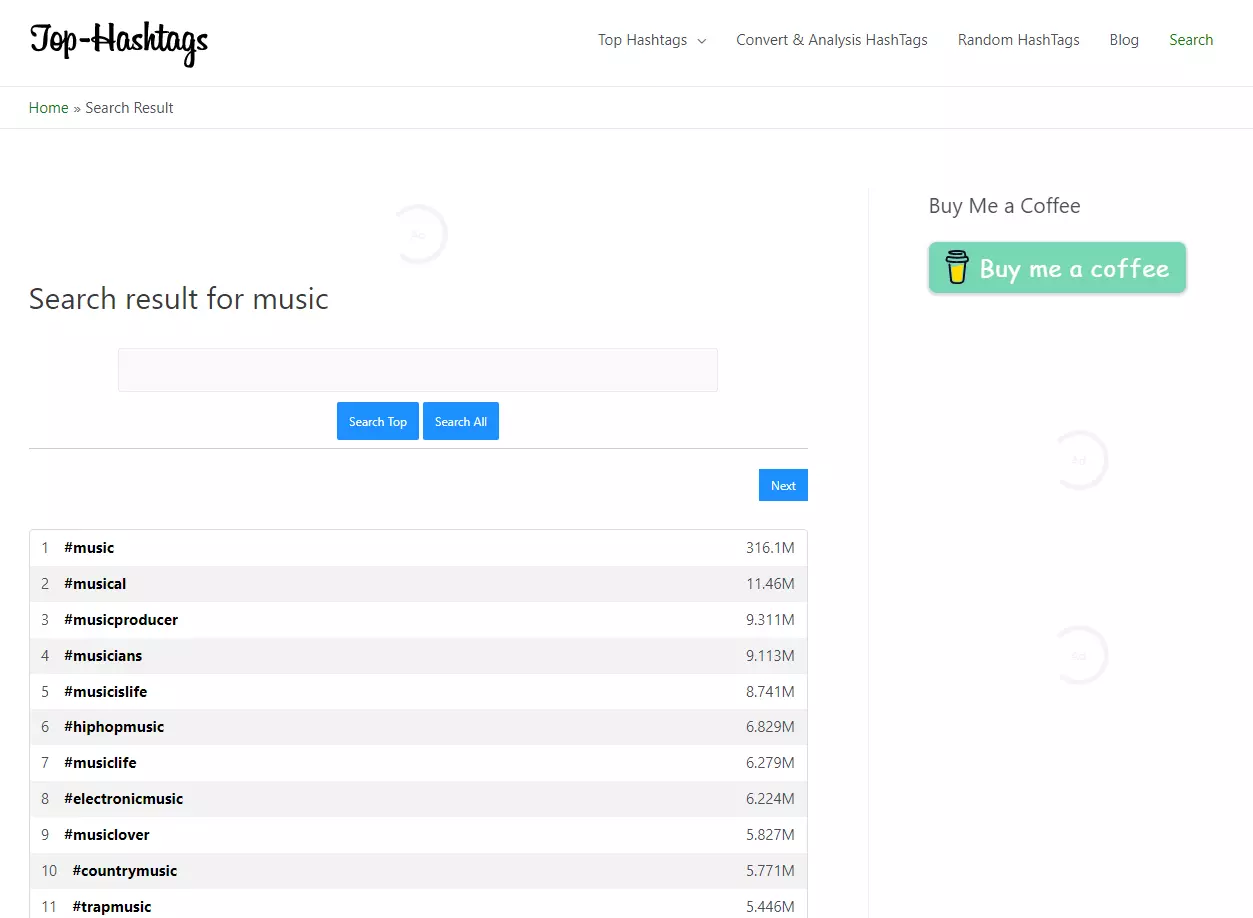
- Use the power of social media tools like Buzzsumo. It is designed to help you find the most engaging topics and monitor popular topics.
![]() Research Top Keywords on Forums
Research Top Keywords on Forums
Online forums like Quora are popular as they answer a wide range of queries for people. You are sure to find questions about your industry and a wide range of other related information.
To find the best keywords, visit the most popular online forums. You can also visit forums popular in your industry.
Look at the top-ranking question or discussion thread and list specific keywords related to your product.
Other tips to source keywords from forums are:
- Install the Ahrefs SEO toolbar. Search in Google for forums about a topic and look at the displayed results to gain insights on what's popular and trending.
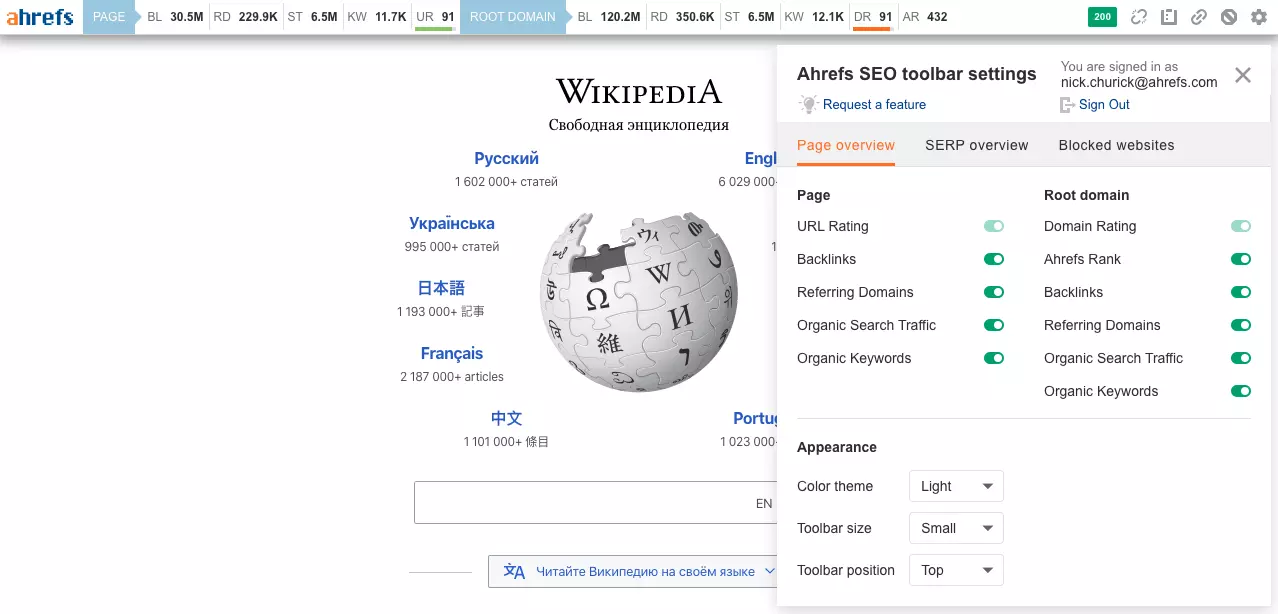
- Go over the posts related to your industry and see what kind of topics get the most queries—plan content around such topics using the keywords.
Common Keyword Research Mistakes People Make
![]() Targeting Broad Keyword Matches
Targeting Broad Keyword Matches
People make a common mistake of casting the keyword net a bit too wide. Businesses often target a lot of high-volume keywords that are too generic.
Here’s an example of high-volume keywords.
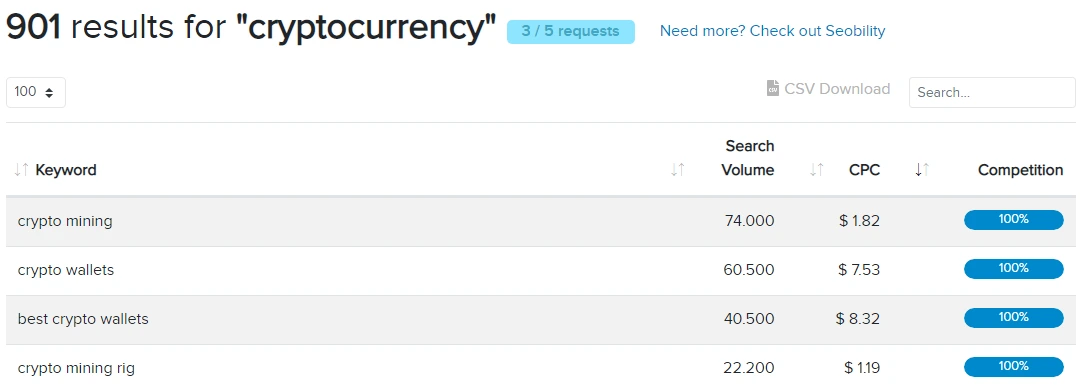
For example, when you target "Painting Services," you may find hundreds of broad match searches but only a few exact ones. Also, you may target a keyword out of context for your business.
For example, targeting "storage services" for an online cloud service provider may prove bad. "Storage" could also indicate storage boxes or storage areas.
Targeting without a clear focus can cause your campaign to be ineffective.
Here are a few tips to get it right:
- Target as many exact keywords as possible.
- Be specific in your keyword targeting when your product or service may have multiple meanings across industries.
![]() Sidelining Search Intent
Sidelining Search Intent
Search intent is, simply put, the reason why someone searches for something online. It could be searching for information, researching a product, or a purchase inquiry. Whatever the intent may be, understanding how they work can impact.
A common mistake is to ignore the user search intent. When you research on types of queries in your domain, ask yourself these questions:
- What is the goal of the user search? Is it purely information, or is it the start of a journey towards a purchase?
Let's say you sell Whirlpool Refrigerators. When targeting keywords, focus on two core aspects:
- Have informational content on the site. For example, what's the most power-saving model available.
- Have a landing page for people to buy the product and check it out.
Here’s an example of a landing page for a service:
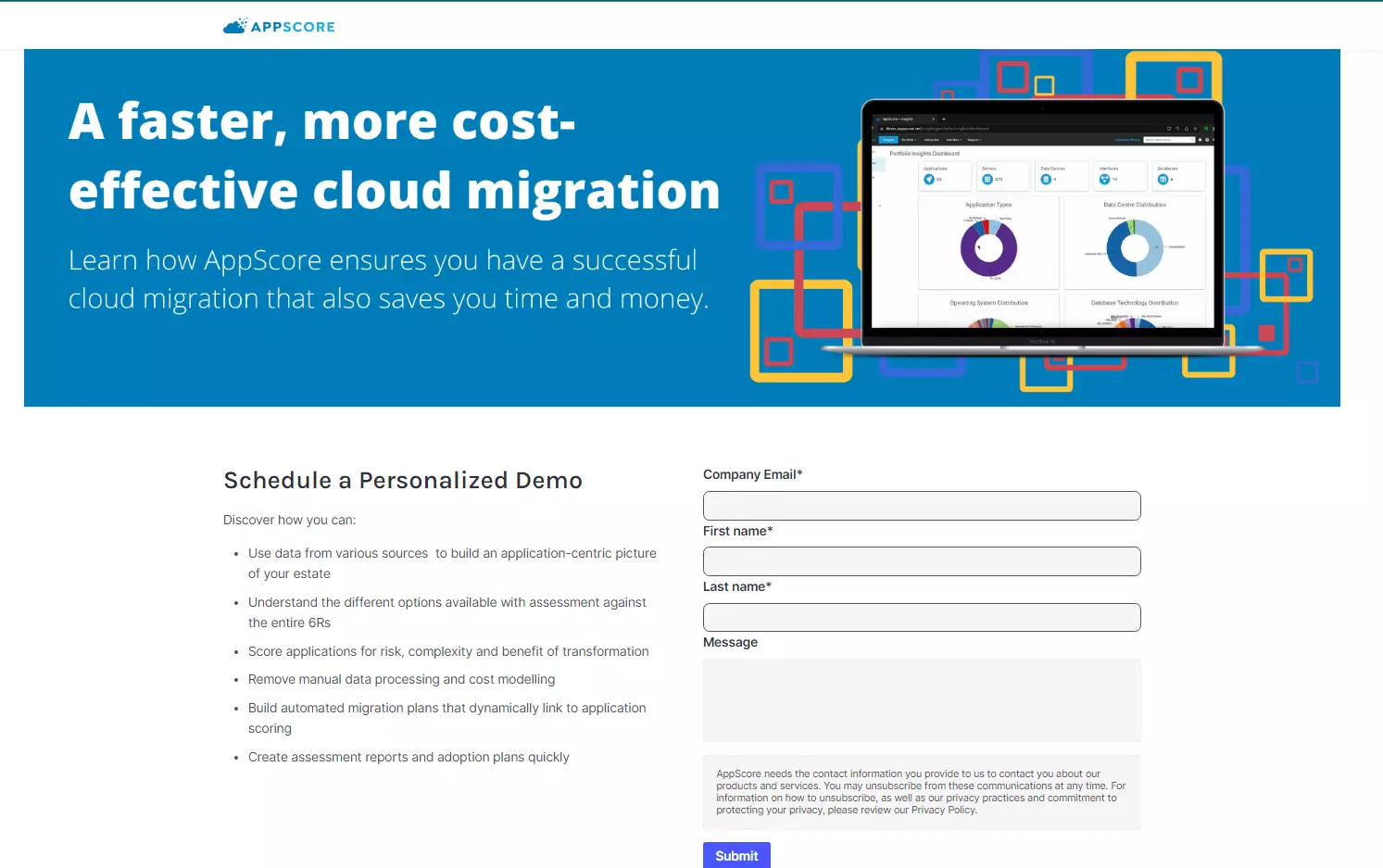
Doing so will address all forms of search intent.
![]() Poor Competitor Research
Poor Competitor Research
Finding out what your competitors are doing is fundamental to any business. It's valuable for SEO. Never ignore competitor research. It could be keeping tabs on their marketing tactics or target keywords for better reach.
A common mistake people make is to put this on the back burner. They either do it at the start of their SEO efforts and forget it or don't do it. You must perform competitor keyword research regularly to gain an edge.
Read: 11 Tips to Handle Local Competition
Here are our top tools to get it right:
- SpyFu: This is a great tool to check the keywords your competitors are targeting. It gives you a detailed report of their keyword strategy.
- SEMRush: This allows you to analyze who is your strongest contenders. You can also check the top keywords that they are targeting.

![]() Poor Customer Engagement
Poor Customer Engagement
You can gain a world of insights during conversations with your customers. A simple discussion in person or on the phone can help you uncover many gaps.
Remember that how you talk about your products and how customers do will be different. For example, a product you may call an "Anti-theft protection unit" may simply be a "burglar alarm" for a customer.
Try and engage with your customers at every chance. Pay attention to the words and terms to discuss their needs or problems. These provide great keyword ideas that could lead to higher traffic.
Read: Tips to Promote & Get More Traffic to Your Website
Try these tips:
- Send out email surveys asking customers to describe what they like or dislike about your products.

- Make a note of other words or terms they use for your product or service and use them in your content.
![]() Narrow Keyword Focus
Narrow Keyword Focus
A common mistake in any keyword strategy is to focus only on one or few keywords.
Businesses tend to build their content around generic keywords that are high-volume. They focus on just one or two main keywords in their industry. This tactic is a poor way to run an SEO campaign.
It generalizes your focus, and hence Google finds nothing that makes your web content stand out. You miss out on discovering other keywords that can rank you much higher.
A few ways to evade this trap are:
- Use Google Suggest, Social media listening, keyword research tools, and more to make a comprehensive list of related keywords. Never target just one or two keywords.
sproutsocial is a good social media listening tool.

- Try unique keywords in your content and SEO plan every few weeks to see which works best.
![]() Bloating Content with Keywords
Bloating Content with Keywords
Loading a page with as many relevant keywords is a big mistake. It is one of the most common tactics used by many SEO agencies. They bloat the content with keywords.
Never fall for this tactic. It is considered unethical, and Google penalizes such sites.
Here’s an example of bloating content with keywords.

Filling your site with such bloated content is bad for SEO and negatively impacts the customer experience. Ensure that your content naturally uses the keywords without overwhelming a user.
Let's look at a few best practices:
- Run a keyword count on each content page. Try and keep the keyword count to less than 5 per page.
- Alternate keywords on the page instead of using the same keyword. Using a related term is much better than repeatedly using the same keyword.
![]() Out of Touch with Customer Trends
Out of Touch with Customer Trends
This is a common mistake most businesses make. It's easy to lose the market's pulse when you are busy with your daily operations.
Knowing what your customers are looking for and understanding the popular trends in your industry goes a long way. Ensure that you keep tabs on it.
Getting a feel for the current trends is excellent for surfacing keyword ideas. In the long-term, it can shape your content strategy better too.
There are plenty of ways to go about it. We recommend the free and the best way to approach it using Google Trends.
Read: 11 Powerful Ways to Use Google Trends for SEO
Google trend is a tool that shows how often a search term is entered into Google. You can narrow down specific words and get insights to help your keyword strategy. You can also search with specific dates or countries.

![]() Ignoring Social Media Chatter
Ignoring Social Media Chatter
Today, social media is the new way millions of people interact with businesses. A social media presence is a must if you want to amplify your reach. A lot of insights for keywords can be gained with social media interactions.
Social media is rich with engagement. A lot of chatter on platforms like Instagram or Facebook can help you identify the most recent trends in your industry. Use social media hashtags and conversations as an anchor to build your keyword database.
Follow these social media tips to do more effective research:
- Keep a logbook with a list of trending hashtags in your industry. Look for popular keywords and curate content around them.
You can find the latest trending hashtags here.

- Look at the social media profile of your competition. It helps you gain a better idea of the common terms in your industry.
Read: Importance of Social Media Marketing for Local Businesses
![]() Not Researching Regularly
Not Researching Regularly
Keyword research is not a one-time effort. A common mistake is to do it at the start of your SEO journey and then ignore it. Keywords are dynamic.
A set of once-popular keywords may not be suitable for targeting a few weeks later. It's vital to be on top of current trends.
You can update keywords in your content by looking them up using Keyword Tool.
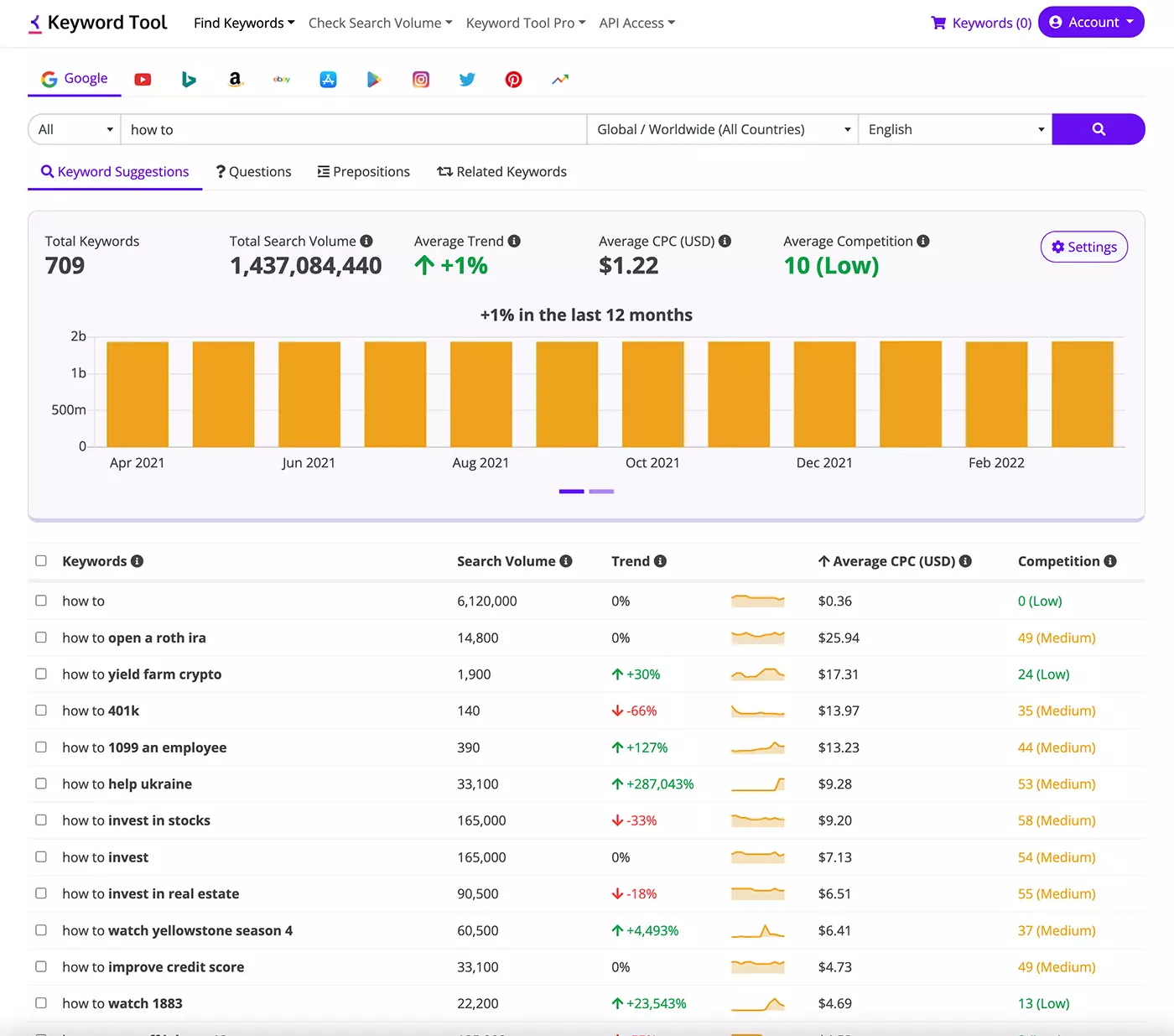
Ensure that you add keyword research as an item in your SEO checklist. Spend time every few weeks to check if the keywords you are targeting are relevant.
Read: Local SEO Checklist: Things to Check Before Launching Your Website
Use these tips for the best results:
- Set up a monthly cadence on your team's calendar. Review a list of current keywords and spend time discussing possible new ones.
- Keep track of new keywords targeted by your competitor at least once a month.
![]() Ignoring Local Keywords
Ignoring Local Keywords
Local keywords target people in a specific location to get them to buy a product or service. Local keywords in your content are crucial if you own a business with a physical presence.
Businesses make the common mistake of not taking local SEO seriously. They target broad keywords that don't fully capture a local searcher's intent.
Use our top tips to build your local SEO presence:
- Spend time analyzing the pulse of the local market and the terms and phrases people use to look for a business. Use unique local words and location names in your web content and metadata.
- Hunt for exact words people use in their searches. Use these in a meaningful way across your content.
Google’s Keyword Planner lets you specify the geographical location you want to target.
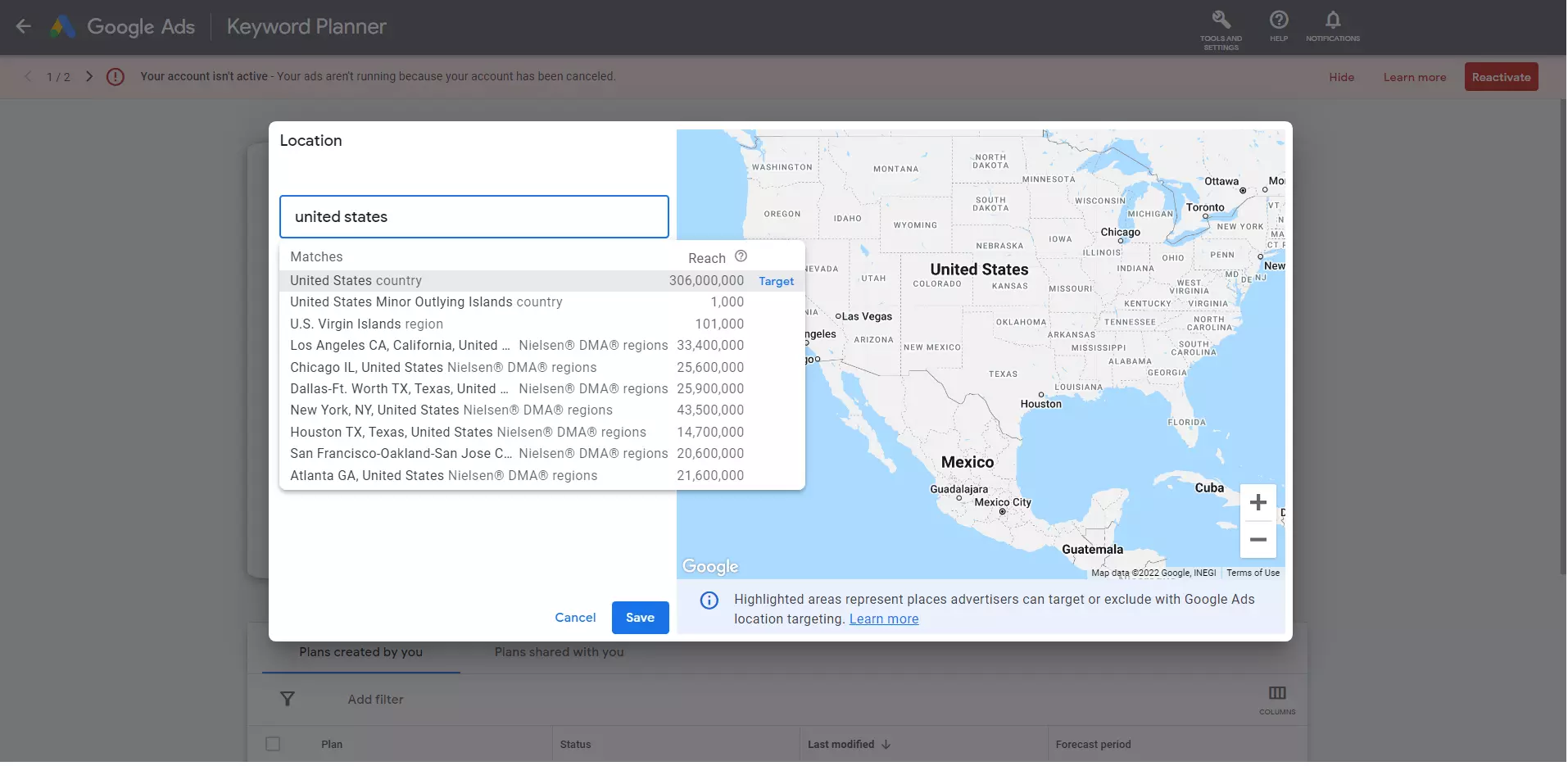
![]() Leaving Out Long-tail Keywords
Leaving Out Long-tail Keywords
Long-tail keywords are easier to rank for and are a great SEO tactic. Think of a phrase like "Blue Reebok Running Shoes." This phrase is easier to rank for instead of, let's say, "running shoes."
Many businesses fail to appreciate the power of using long-tail keywords in their SEO strategy. A good balance between short keywords and long-tail ones goes a long way in executing a winning SEO campaign.
Here are a few ways to get long-tail keyword ideas:
- Use Google suggest. Type in a query in Google, for example, "car repair," and see the list of auto-populated suggestions. This may include locations or car models, and much more. Use these suggestions to fine-tune your list of keywords.

- Engage in customer conversations. Notice the words and phrases they use to describe your product. Use these in your keyword strategy.
![]() Ignoring Search Intention
Ignoring Search Intention
Targeting keywords with high volume is a proven SEO strategy. It helps grow your inbound traffic volumes. However, doing it too much can have negative implications. High-volume keywords often ignore why people are searching for a product or service.
Using high-volume keywords only can cause another problem. They are highly competitive. Your competitors are likely using them too. So, how do you stand out?
A better strategy is to use high-volume keywords with long-tail keywords. A balanced approach can bring more visibility and address all forms of customer search intent.
Read: Common Keyword Research Mistakes People Often Do In SEO
Look for search terms with medium volume. You can rank for them with ease and have lesser competition than other keywords used by others in your industry.
Here’s a screenshot of medium competition keywords.

Important Keyword Research Stats
- 92.42% of keywords get ten monthly searches or fewer. (Ahrefs)
- 13.53% of keywords with ten searches per month or fewer consist of only one or two words. (Ahrefs)
- 0.16% of the most popular keywords are responsible for 60.67% of all searches (Ahrefs)
- Around 8% of queries are searched as questions. (Moz)
- Long-tail keyword searches have higher click-through rates. They are almost 3% to 5% higher than generic searches.
- 69.7% of search queries contain four words or more. (Ahrefs)
- Organic traffic and competitive analysis are still relevant and essential for good SEO.
Keyword Research FAQs
What is Keyword Research?
It is the practice of finding actual search terms people use when looking for information online. It can be as short as one word or a longer phrase of multiple words
Why is it Important?
Keyword Research offers insights into current trends and the needs of your customers. You can use these words as part of your SEO strategy to rank higher on search engines. Good keyword research leads to higher traffic, visibility and sales.
How Much Does It Cost?
The cost of keyword research varies when you hire an agency. If your business spans multiple locations, you can expect a higher fee for research. Agencies may charge you hourly or for a specific number of keywords.
Can I Do Keyword Research Myself?
You can perform your analysis using many free and paid tools. Many small businesses do their keyword research without aid from an external SEO agency. Make sure you read up on the best practices for research.
How Long Does It Take?
It can take anywhere from a few days to several weeks. It depends on the volume of keywords you wish to compile. It also varies based on the industry and audience you want to target.
Are There Free Keyword Research Tools?
Yes. There are dozens of free keyword research tools online. Google themselves provides a wide range of free keyword research and analysis tools. For example, You can use Google Trends to find trending search terms across the internet.
What are the Top Three Free Research Tools?
Ahrefs Keyword Generator, Answer The Public, and UberSuggest is a few popular free tools. You can gain great keyword insights by using these tools for your SEO campaigns.
What are the Top Three Paid Research Tools?
SEMRush, KWFinder, and Growth Bar are examples of a few paid tools. Most paid tools come with a free trial with limited features. Choose a subscription tier best suited for your business.
How Do I Start Keyword Research?
Start by making a list of all the key terms and topics relevant to your business or industry. Use free or paid tools to make a list of unique words related to your business.
Does My Competition Matter for Keyword Research?
Absolutely! Finding out what keywords your competitors rank for is a vital keyword research strategy. Use tools like SpyFu to track these keywords and build a more effective keyword strategy.
When Will I See Results of Keyword Research?
Like any SEO tactic, your keyword strategy won't deliver instant results. Be patient and follow best practices to see good results. Expect anything from a few weeks to several months until you reap the benefits.
Is Country Important for Keyword Research?
If you sell your products overseas or have branches in other countries, you must factor in the keywords in each country. Local keywords make a big difference when creating or localizing your content.
Is Keyword Research For Social Media Different?
The terms and phrases people use to search on social media platforms are much different from what they use for a Google search. Platforms like Twitter or Instagram run on hashtags. Researching these can offer insights into customer trends.
How To Start Keyword Research for Local SEO?
Start by understanding your local audience and their needs. Next, identify your competitors and analyze the keywords they are targeting. Create content with a local flavor. Use as many local keywords and locations in your content in a meaningful way.
What are High Volume Keywords?
Keywords that show up more on online searches are called high-volume keywords. These are searched most on search engines like Google or Bing. Targeting high-volume keywords is a great starting point for an effective SEO strategy.
What are Long-tail Keywords?
People sometimes use longer phrases that consist of more than 2-3 words in their searches. For example, "Computer repairs hard drive recovery in LA." These are called long-tail keywords. Identifying and targeting these help with SEO efforts.
What is Keyword Stuffing?
Keyword stuffing is an unethical SEO practice. It involves adding your target keywords all over your content or site in the hope of gaining SEO rankings. Google penalizes keyword stuffing. Avoid this practice at all costs.
How Often Should I Research Keywords?
Common mistake companies make to do keyword research at the start of their SEO effort and then ignore it. Keywords should be researched regularly. Conduct a keyword audit at least once every month and optimize your site accordingly.
When To Hire A Company for Keyword Research?
Most small businesses do not need to hire an agency just for keyword research. Hire an agency only if your business is large and spans cities or countries. An ideal scenario would be for franchises.
Will keywords Affect My Content Strategy?
Absolutely! Your choice of keywords has a big impact on the content you create. Your content strategy will be ineffective if it does not use the findings of your keyword research. Update your content with new keywords often.
Are Keywords Useful Only for Content?
It is a common misconception that keywords only affect content creation. Keywords make a difference in technical SEO and off-page SEO too. You can use them in your metadata and XML files to quickly help Google find your pages.
What Other SEO Types Benefit from Keyword Research?
Keyword Research has demonstrable benefits in all SEO aspects. Whether it's on-page, off-page, or technical SEO, you can leverage its benefits in all these areas.
Does Keyword Research Impact Conversions?
Keywords have a direct impact on conversions. Using keywords with the right search intent can drive a sale sooner. Planning your content around user search intent is a sure way to optimize it for conversions.
What Are Good KPIs for Keywords?
A few KPIs that are useful to measure for keywords are competition level and volume. You can also track the keywords ranking in each state or country if your business is multi-location.
- What is Keyword Research?
- Importance of Keyword Research
- Uncover Market Trends
- Gain Web Traffic
- Generate Leads
- Better Content Strategy
- Focused Audience targeting
- Rank High in Search Results
- Gain Social Shares
- Beat Your Competition
- Keyword Research Tips
- Use Google Suggest
- Go Local
- Get To Know Your Industry
- Identify Hot Content Ideas
- Research Competitor Keywords
- Investigate Long-tail Keywords
- Use Google Keyword Planner
- Leverage Seasonal Trends
- Analyse Google Search Console Data
- Use Keyword Research Tools
- Do Social Media Keyword Research
- Research Top Keywords on Forums
- Keyword Research Mistakes
- Targeting Broad Keyword Matches
- Sidelining Search Intent
- Poor Competitor Research
- Poor Customer Engagement
- Narrow Keyword Focus
- Bloating Content with Keywords
- Out of Touch with Customer Trends
- Ignoring Social Media Chatter
- Not Researching Regularly
- Ignoring Local Keywords
- Leaving Out Long-tail Keywords
- Ignoring Search Intention
- Important Keyword Research Stats
- Keyword Research FAQs

 Uncover Market Trends
Uncover Market Trends